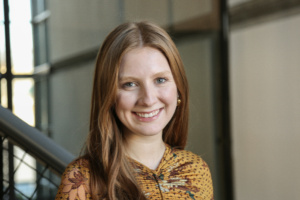Our annual Winter Awards Banquet culminates with the presentation of the Ralph Mosley Award for Excellence to one individual who embodies and embraces the spirit of ThinkingAhead. They exhibit high ethical standards, commitment through years of service, consistent performance, a positive influence on the company and its employees, and active community involvement. The recipient of the 2022 Mosley Award is Derek Schlender, a Partner in our Banking and Commercial Finance Practice.
Jessica Martinez, a Partner in the Nonprofit Practice and last year’s Mosley recipient says of Derek, “His humble nature and commitment to doing the job well has put him in a position where others feel comfortable asking for advice. He is an example to all of us of how to run our desks both technically and ethically.”
For Derek, technical and ethical excellence is a product of his persistence and staying true to his narrow, well-established niche of SBA Lending. Below are pieces from a conversation with Derek on those key ingredients to his success:
Jessie Miller: You’ve talked about how, for the first year or so of recruiting, your results did not reflect the effort you were putting in. What did you learn about perseverance during that time?
Derek Schlender: With a lot of jobs, you can pretty quickly draw the correlation from the activity to the payoff, but this job is unique in that the lag between those is typically three to four months at best. So, when it was six months, and I hadn’t been billing consistently at all, I think I just had to be mentally tough and trust the process.
I would tell new people to give yourself the benefit of the doubt to not trust yourself. Don’t trust your own ability to assess how well you’re doing or whether it’s worth it. Instead ask yourself, “Am I putting in the work? Am I following the recipe? The success dashboard?” Because I think I did that without knowing it. I did what I was told I needed to do, and looking back I know it was more worth it than I felt like it was at the time.
Even the skill set you’re building in that time is important. It’s like riding a bike: once you learn how to do it, you never forget. You just hop on the bike and ride it. So, I don’t ever have to go through that again, and it’s not wasted.
JM: What do you wish you could tell that version of yourself now?
DS: I think the perspective I would give to a recruiter just starting out is that you must mentally coach yourself to stop believing the lie that you can have anything quickly. And that’s true for everything. If you think about it, nobody actually thoroughly enjoys the things they get quickly. I think that’s a good way to think about it. Like, when has instant gratification worked out for you?
JM: Do you remember any advice you received from any of the more senior recruiters during those first few months?
DS: Tim Knight said something to me during the hardest time like, “what you are doing right now is putting in the spade work.” He was talking about the idea that you have to kind of get your trowel out and go weed your garden every morning. If you ever want to have something that’s truly beautiful, there will be certain things you have to do consistently. You’re never going to graduate from the basics, and I have never forgotten that.
I also remember Stephanie Maas’s comment, which has been quoted multiple times, that “good recruiters are good listeners. Phenomenal recruiters are phenomenal listeners.” I think it has really stuck with me because I’ve thought more actively about asking better questions, because the value that I bring to a conversation is truly hearing what the other person is saying to me. I think I’ve learned to do that better over time.
Finally, the people who have been doing this a long time: Tim, Stephanie, Jay, Chris Gray; they all would just tell me I was crushing it when I didn’t feel like I was crushing it. They’d say, “It’s happening for you; you just don’t know it yet.”
JM: What is one question that you most frequently ask your clients and candidates?
DS: For candidates, I always tell them, “Look, I’m not calling you because I’ve assumed that you’re looking. I’m not assuming that I’m going to be the recruiter that calls you once and gets you to make a move. I’m really here just to get to know you and understand how things are going for you. And if I can identify something that would be better for you, most people want to hear about that. That is all I’m interested in. Let’s talk about what’s better than where you are.”
When I’m talking to a client, one question that can be helpful is just asking them, “If you had the chance to work with a recruiter and have the most value from that interaction, what does that look like for you?” I also like to ask them what they’ve experienced with recruiters before and what I could do that would make the experience of working with me ideal in their mind.
JM: You have a very established niche in the SBA lending market. How did you establish that niche, and how has serving such a narrow, specific group been helpful in your practice?
DS: The smaller your specialty, the better, I have found. I want to be relevant to everyone I talk to, even if I talk to fewer people. If I’m in general banking and I’m calling broadly on someone with a mortgage need and a commercial banking need and all these different things—when I only do one–I might find that I’m invalid. So, this niche came about as a decision to aim small and do one thing very well. Instead of being an inch wide and a mile deep, I want to be a mile deep and an inch wide.
JM: How do you think you have grown most as a recruiter?
DS: I think I’ve grown most in coming across as a product expert. I’m an expert at what I do, and I have gotten better at being able to talk about the success we’ve had as a firm and as a team. I only recruit in SBA lending, and I tell people that. So, I have gotten more comfortable with that product and the people that provide service within that industry. When I talk to people now, very seldom does something come up that I’m not familiar with.
I think the way that you build that knowledge is by being a very innately curious person on the phone with people, and people aren’t turned off by that. Be willing to shine a light on the areas that you feel insecure because you think you should know better. Why should you? Ask the question, learn what you can, and make notes on everything you need to research in your downtime. So, I did that. I looked up stuff on Investopedia that I didn’t know. And you don’t have to ask the question if you can put the pieces reasonably well together, you just have to be willing to ask someone, “Hey, can you help me?”
…
Derek has been a Recruiter with the Commercial Banking and Finance team at ThinkingAhead since 2018. Derek is a Partner and leads the SBA/Government Guaranteed Lending Practice, placing director/manage level leaders, business development officers, underwriters, and operations specialists nationwide.
Derek attended the Terry College of Business at the University of Georgia, where he earned a degree in Business Management, and he is a Certified Personnel Consultant (CPC). He and his family of five live in the Nashville area.




